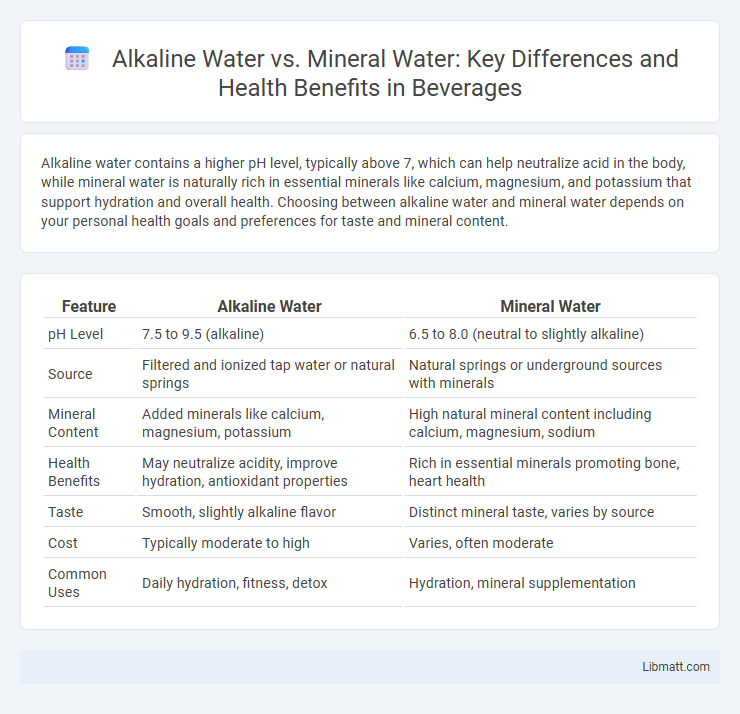Alkaline water contains a higher pH level, typically above 7, which can help neutralize acid in the body, while mineral water is naturally rich in essential minerals like calcium, magnesium, and potassium that support hydration and overall health. Choosing between alkaline water and mineral water depends on your personal health goals and preferences for taste and mineral content.
Table of Comparison
| Feature | Alkaline Water | Mineral Water |
|---|---|---|
| pH Level | 7.5 to 9.5 (alkaline) | 6.5 to 8.0 (neutral to slightly alkaline) |
| Source | Filtered and ionized tap water or natural springs | Natural springs or underground sources with minerals |
| Mineral Content | Added minerals like calcium, magnesium, potassium | High natural mineral content including calcium, magnesium, sodium |
| Health Benefits | May neutralize acidity, improve hydration, antioxidant properties | Rich in essential minerals promoting bone, heart health |
| Taste | Smooth, slightly alkaline flavor | Distinct mineral taste, varies by source |
| Cost | Typically moderate to high | Varies, often moderate |
| Common Uses | Daily hydration, fitness, detox | Hydration, mineral supplementation |
Introduction to Alkaline Water and Mineral Water
Alkaline water contains a higher pH level, typically above 7, which may help neutralize acid in your bloodstream and improve hydration. Mineral water is naturally sourced from springs or underground reservoirs, rich in essential minerals like calcium, magnesium, and potassium that support overall health. Understanding the distinct properties of alkaline and mineral water helps you make informed hydration choices tailored to your wellness needs.
What is Alkaline Water?
Alkaline water has a higher pH level than regular drinking water, typically above 7, often ranging between 8 and 9. It contains alkaline minerals like calcium, magnesium, and potassium, which can help neutralize acid in your bloodstream. Your choice of alkaline water can contribute to improved hydration and potentially support better bone health and metabolism.
What is Mineral Water?
Mineral water is naturally sourced from underground reservoirs and contains essential minerals like calcium, magnesium, and potassium, which contribute to its unique taste and health benefits. Unlike alkaline water, which is often treated or enhanced to increase pH levels, mineral water's composition is naturally balanced and regulated by geological conditions. Your choice between mineral and alkaline water depends on whether you prioritize natural mineral content or specific pH levels for hydration.
Source and Production Methods
Alkaline water is produced through processes like electrolysis, which increases the water's pH by separating acidic and alkaline components, often utilizing tap water as its source. Mineral water originates from natural springs or underground reservoirs, retaining essential minerals such as calcium, magnesium, and potassium through minimal processing. Understanding these distinct source and production methods helps you select water that aligns with your health preferences and hydration needs.
Key Differences in Composition
Alkaline water typically has a higher pH level, usually above 7, due to added minerals like calcium, magnesium, and potassium, which neutralize acidity. Mineral water naturally contains a variety of dissolved minerals such as calcium, magnesium, sodium, and bicarbonates, derived from underground rock formations. The essential difference lies in alkaline water's intentional pH adjustment versus mineral water's naturally occurring mineral content and balanced pH.
Health Benefits of Alkaline Water
Alkaline water with a higher pH level (typically between 8 and 9.5) may help neutralize acid in the bloodstream, potentially improving hydration and reducing acid reflux symptoms. It contains minerals such as calcium, potassium, and magnesium that support bone health and muscle function. Some studies suggest alkaline water can enhance antioxidant activity, which may reduce oxidative stress and promote overall well-being.
Health Benefits of Mineral Water
Mineral water contains essential minerals like calcium, magnesium, and potassium that support bone health, cardiovascular function, and electrolyte balance. Regular consumption of mineral water can improve hydration while providing trace minerals that may enhance metabolic processes and reduce the risk of chronic diseases. Studies suggest that the natural mineral content in mineral water can also aid digestion and promote overall wellness.
Potential Risks and Side Effects
Alkaline water may cause digestive issues such as upset stomach or reduced acidity, potentially affecting natural gut flora and enzyme function. Mineral water, while generally safe, can contain varying levels of minerals like sodium or calcium, which might pose risks for individuals with hypertension or kidney conditions. You should consult with a healthcare professional before making significant changes to your water intake to avoid adverse effects on your health.
Consumer Preferences and Market Trends
Consumer preferences show a growing inclination toward alkaline water due to its touted health benefits such as improved hydration and acid-base balance. Mineral water remains favored for its natural source and rich mineral content, appealing to those seeking essential nutrients. Your choice often depends on whether you prioritize pH level customization or naturally occurring minerals, as market trends reveal increasing demand for both varieties driven by health-conscious consumers.
Which Water is Best for You?
Alkaline water, with a higher pH level, may help neutralize acid in your body, potentially benefiting those with acid reflux or digestive issues, while mineral water contains essential minerals like calcium and magnesium that support bone health and hydration. Choosing the best water depends on your specific health needs and taste preferences, as alkaline water might aid in balancing your body's pH, whereas mineral water provides natural electrolytes important for bodily functions. Understanding these distinctions can help you select the water that best supports your overall wellness.
Alkaline water vs mineral water Infographic

 libmatt.com
libmatt.com